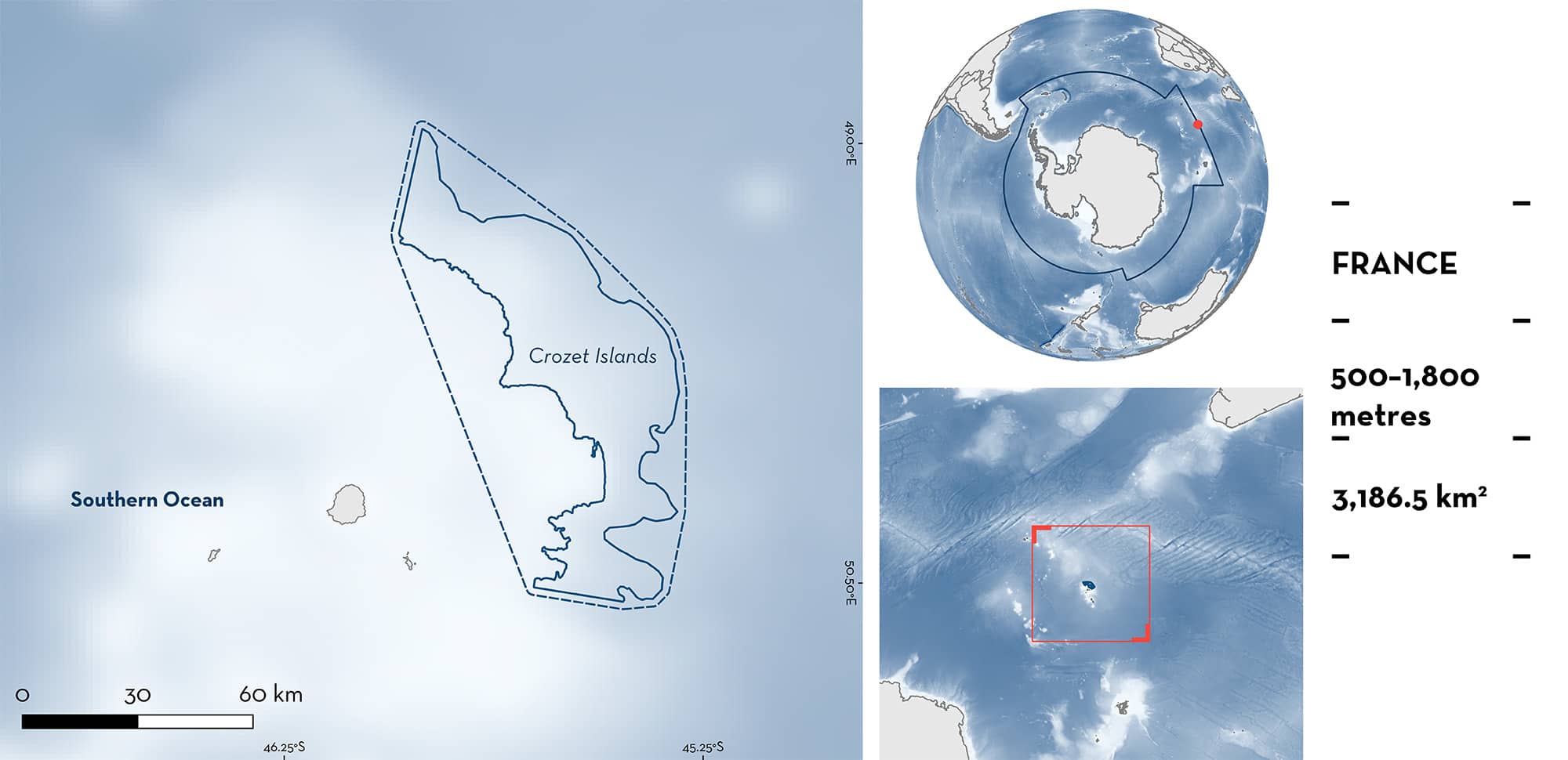ISRA FACTSHEETS
ISRA FACTSHEETS
POLAR WATERS REGION
Crozet Islands
Summary
Crozet Islands is located in a remote sub-Antarctic archipelago, halfway between Antarctica and the southern tip of Madagascar. The area is characterised by rugged insular slopes with canyons and terraces. It is influenced by the sub-Antarctic Front flowing eastward with elevated productivity. The area overlaps with the Prince Edward Islands, Del Cano Rise and Crozet Islands Ecologically or Biologically Significant Marine Area, and with the National Natural Reserve of the Terres australes françaises. Within this area there are: range-restricted species (Whiteleg Skate Amblyraja taaf).
Download factsheet
Crozet Islands
DESCRIPTION OF HABITAT
Crozet Islands is located halfway between the southern tip of Madagascar and Enderby Land, Antarctica. The area is part of the isolated Crozet Islands sub-Antarctic archipelago in Terres australes et antarctiques françaises/French Southern and Antarctic Lands (TAAF). The archipelago lies ~1,000 km east of the Prince Edward Islands and ~1,400 km west of the Kerguelen Islands. The area is part of a larger plateau and is mostly comprised of insular slopes, with several canyons and terraces. The seafloor of this volcanic archipelago is rugged (Pruvost et al. 2015; Meyzen et al. 2016).
The area is broadly influenced by the eastward flowing Antarctic Circumpolar Current, with one of its main branches, the sub-Antarctic Front, also flowing eastward through the area (Bon et al. 2015). This is a dynamic area with eddies and fronts concentrating productivity (Bon et al. 2015).
This area overlaps with the Prince Edward Islands, Del Cano Rise and Crozet Islands Ecologically or Biologically Significant Marine Area (EBSA; CBD 2024) and with the National Natural Reserve of the Terres australes françaises.
This Important Shark and Ray Area is benthopelagic and subsurface and is delineated from 500–1,800 m based on the depth range of the Qualifying Species in the area.
CRITERION B
RANGE RESTRICTED
Crozet Islands holds the regular presence of Whiteleg Skate as a resident range-restricted species. Whiteleg Skates are captured as incidental catch in the Patagonian Toothfish Dissostichus eleginoides longline fishery which operates year-round in this area but with a peak in effort during February and March (CCAMLR Secretariat 2023). Longlines are set between 500–1,800 m depth (Pruvost et al. 2015). Whiteleg Skates make up ~3% of the total catch in the whole Crozet region (des Clers & Deleau 2021). Reported catch of the species from 2009–2022 in the Crozet region had a mean of 29.3 t per year, with ~235,000 individuals released in total (CCAMLR Secretariat 2023). The relative frequency of occurrence on longlines was ~38% in 2021 and ~57% in 2022, when detailed observer data were available (CCAMLR Secretariat 2023). Locations available from a subset of captures indicate a hotspot off Île aux Cochons within the area (CCAMLR Secretariat 2023). The area was also selected for a recent post-release survival tagging study of Whiteleg Skates due to the high frequency of captures (~20 individuals per 1,000 hooks) (Faure et al. 2024). Whiteleg Skates are only found around sub-Antarctic islands and banks south of the Indian Ocean, including Crozet, Ob and Lena Banks, Elan Bank, southern Kerguelen Plateau, Marione Dufresne Bank, and Marion and Prince Edwards Islands (Pollom et al. 2020). However, the species is rarely captured in most sites outside the Crozet Islands Exclusive Economic Zone (EEZ) and Elan Banks (des Clers & Deleau 2021; Faure et al. 2023), highlighting the importance of this area for this range-restricted species.
Download factsheet
SUBMIT A REQUEST
ISRA SPATIAL LAYER REQUEST
To make a request to download the ISRA Layer in either a GIS compatible Shapefile (.shp) or Google Earth compatible Keyhole Markup Language Zipped file (.kmz) please complete the following form. We will review your request and send the download details to you. We will endeavor to send you the requested files as soon as we can. However, please note that this is not an automated process, and before requests are responded to, they undergo internal review and authorization. As such, requests normally take 5–10 working days to process.
Should you have questions about the data or process, please do not hesitate to contact us.


